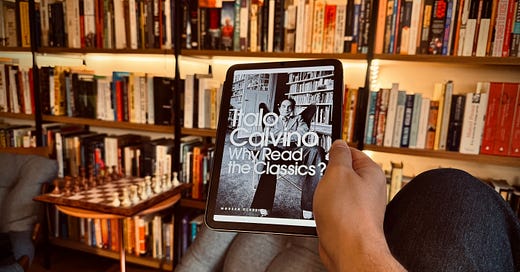In literary tastes, turning 40, and Arthur’s pendulum theory, I wrote that “the implication of that inevitable pendular movement is not making me want to stop reading but rather change what kind of books I want to read,” and “I still feel a strong desire to read or reread some classics.”
But why read (or reread) the classics?
Italo Calvino wrote a collection of essays called exactly Why Read the Classics? exploring the significance of classic literature, and sharing his reflections on what makes a book a “classic”. Why these works remain relevant over time? The essays are a blend of literary criticism, reviews, and personal appreciations, showcasing Calvino’s deep engagement with literature—at the level I wish for myself—, and his belief that classics should be read out of love rather than duty.
“…read out of love rather than duty.”
It’s interesting because a lot of people I know see the act of reading as a duty. Mostly because it takes them back to the school days when teachers would demand that they read a book and write a summary of a school assignment only, without telling why, without showing it’s equally fun and important, and not homework.
In the first essay of the book, Calvino wrote fourteen definitions of a classic. I’ll borrow some of them for this post to explain why read the classics. The very first one is “The classics are those books about which you usually hear people saying: ‘I’m rereading …’, never ‘I’m reading …’.”
From 30 years old to now, I established a goal to read the classics. There were hundreds of books I hadn’t read and couldn’t give myself the pride of saying “I’m rereading…”. As the avid reader that I believe I am and as a writer, I always had in mind that the number of I-m-rereadings in terms of classics should always be immensely superior to the number of I-m-readings. I always enjoyed these well-read authors who would cite or mention other works in their stories and I always felt a little sad when I didn’t know what they were talking about. Not that we should always understand every author’s reference, but it’s much cooler and interesting when we do.
Now, I believe I have a fair amount of classics to reread, and rereading them ten years later will give me a completely new view of the works. Especially because, as Calvino also wrote, “a classic is a book which with each rereading offers as much of a sense of discovery as the first reading,” not to mention that a book you’ve read ten years ago is never the same book. Trust me.
But there are a lot of classics I haven’t read yet, which leads us to “a classic is a book which even when we read it for the first time gives the sense of rereading something we have read before.”
Have you ever felt like that? The first time you read a classic is a constant loop of huh moments where you find sayings, ideas, concepts, and even words that belong to a whole culture and you never stop to think about where it came from in the first place.
I think it comes from the fact that classics leave traces, they exercise influence in the reader’s mind, and they imprint ideas and concepts in our minds. And later, it’s like it all belonged to us and the world.
That’s why I have a strong desire to read or reread classics while my reading taste gradually slants toward nonfiction. “The classics are those books which constitute a treasured experience for those who have read and loved them, but they remain just as rich an experience for those who reserve the chance to read [or reread] them for when they are in the best condition to enjoy them.”
Read more classics, and read Italo Calvino’s Why Read the Classics?
☕️ How about you? Do you read classics? What do you like the most about them?





Excelente. Eu também montei uma lista com livros clássicos que eu estava devendo e estou há três anos tentando esgotá-la. Emendei Guerra e Paz, Ilíada, Odisseia e Eneida nessa lista. Um mundo novo se abriu para mim.